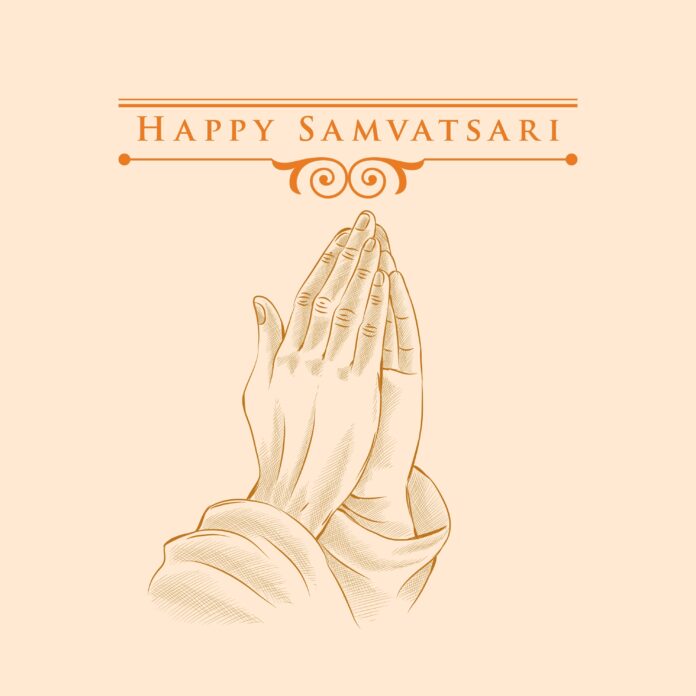Table of Contents
ToggleSamvatsari Festival 2024
Samvatsari, the most important festival for Jains, is often referred to as the “Festival of Forgiveness.” It marks the conclusion of the eight-day Paryushan festival, during which Jains practice self-discipline, and reflection, and seek forgiveness for their wrongdoings. This sacred day symbolizes spiritual purification, inner peace, and moral rejuvenation, making it a crucial part of Jainism’s religious calendar. Let’s explore the details of the Samvatsari Festival 2024, its date, history, and the reasons behind its celebration.
Also Read: Nuakhai Festival 2024: Date, History, How to Celebrate
Samvatsari Festival 2024 Date
In 2024, the Samvatsari festival will be celebrated on September 7th, according to the Jain calendar, which follows the lunar cycle. This date may vary slightly depending on the sect (Shwetambar or Digambar) and geographical location.
Key Points:
- Samvatsari Date (Shwetambar Sect): September 7, 2024
- Samvatsari Date (Digambar Sect): Likely September 8, 2024 (1 day after Shwetambar)
Jains celebrate Samvatsari as the last day of Paryushan, a significant eight-day period for self-purification through fasting, prayers, and meditation. Each year, the date of Paryushan changes depending on the lunar calendar, but it usually falls between August and September.
History of Samvatsari
Samvatsari has deep historical roots in Jainism, dating back to ancient India when Jain Tirthankaras (spiritual teachers) introduced ethical and spiritual practices that are still followed today. The festival’s importance is linked to the teachings of Lord Mahavira, the 24th Tirthankara, who emphasized Ahimsa (non-violence), Anekantavada (multiple perspectives), and Aparigraha (non-possessiveness). These principles form the foundation of Jain philosophy and are central to the rituals performed during Samvatsari.
Key Points:
- Ancient Origins: The practice of forgiveness can be traced back to early Jain teachings and scriptures.
- Teachings of Lord Mahavira: Non-violence, truthfulness, and forgiveness are the core principles that influence Samvatsari.
- Samvatsari Kshamavani: The concept of seeking forgiveness, known as Kshamavani, is believed to help individuals cleanse their soul from accumulated karma.
Historically, Samvatsari has evolved into an essential occasion for Jains to reflect on their actions throughout the year. The day’s rituals, including asking for forgiveness, highlight Jainism’s commitment to fostering compassion, non-violence, and mutual respect in society.
Why We Celebrate Samvatsari
Samvatsari is primarily celebrated to promote forgiveness and reconciliation. It is a day for introspection, where individuals acknowledge their mistakes, seek forgiveness, and forgive others. The act of forgiveness during Samvatsari is not limited to one’s immediate family or friends but extends to all living beings. The festival represents a commitment to spiritual cleansing, self-improvement, and fostering positive relationships with others.
Key Reasons for Celebration:
- Forgiveness (Micchami Dukkadam): One of the most important aspects of Samvatsari is asking for forgiveness from others for any harm done knowingly or unknowingly. The phrase “Micchami Dukkadam” means “May all my misdeeds be forgiven.”
- Karma Cleansing: Jains believe that negative emotions such as anger, hatred, and jealousy accumulate bad karma, which can hinder spiritual progress. By seeking forgiveness, individuals can neutralize negative karma.
- Self-Reflection: The festival encourages participants to reflect on their actions, thoughts, and words over the past year, helping them cultivate mindfulness and awareness in their lives.
- Fasting and Austerity: Many Jains observe strict fasting during Paryushan, which culminates on Samvatsari. Fasting helps in purifying the body and mind, focusing on spirituality, and reducing worldly attachments.
Rituals and Customs During Samvatsari
Samvatsari is observed with several rituals and customs, each emphasizing self-discipline, devotion, and the act of seeking and offering forgiveness.
1. Fasting (Upvas)
- Jains observe fasting during Paryushan, with the most intense fasts occurring on Samvatsari. While some individuals fast for the entire day, others may fast for several days or abstain from specific foods.
- Fasting is believed to purify the body and mind, helping individuals focus on their spiritual practices.
2. Pratikraman
- Pratikraman is the act of reflecting on one’s behavior and repenting for past mistakes. This ritual is performed twice daily by Jains, but it holds special significance on Samvatsari.
- During Pratikraman, Jains recite prayers, perform rituals, and ask for forgiveness from all living beings, recognizing any harm caused.
3. Seeking Forgiveness
- The central ritual of Samvatsari is seeking forgiveness from others. Jains approach their family members, friends, and even acquaintances to say “Micchami Dukkadam” or “Uttam Kshama”, asking them to forgive any wrongdoings.
- This practice fosters harmony, compassion, and humility, reminding individuals to prioritize relationships over conflicts.
4. Confession of Sins
- Jains confess their sins and wrongdoings to a spiritual leader or during a private meditation. This practice is known as “Samayik”, where the individual reflects on their moral shortcomings.
- It is believed that confessing sins allows for personal growth and helps cleanse one’s soul from the negative karma accumulated throughout the year.
5. Sermons and Spiritual Discourses
- On Samvatsari, Jain temples organize sermons, spiritual discourses, and gatherings where monks and spiritual leaders discuss the significance of forgiveness, non-violence, and self-discipline.
- These sermons inspire individuals to practice compassion, kindness, and humility in their daily lives.
6. Meditation and Chanting
- Meditation is a key part of the Samvatsari rituals. Jains meditate to calm their minds, improve focus, and connect with their inner selves.
- Chanting mantras and prayers dedicated to Lord Mahavira and other Tirthankaras is also common, with devotees seeking spiritual enlightenment and inner peace.
Significance of Samvatsari in Jainism
Samvatsari holds immense spiritual significance for Jains. It is more than just a religious festival; it is a day of moral cleansing, spiritual reflection, and forgiveness. The festival emphasizes that no human is perfect, and everyone makes mistakes. However, through forgiveness, individuals can overcome these mistakes, cleanse their souls, and move forward on the path to liberation.
Key Takeaways:
- Spiritual Purification: Samvatsari is considered an opportunity to purify the soul and reduce negative karma.
- Non-Violence: The festival reinforces the Jain principle of Ahimsa, which extends to thoughts, words, and actions.
- Forgiveness and Reconciliation: It encourages forgiveness, promoting a peaceful and harmonious society.
- Path to Liberation: Forgiveness is seen as a vital step on the path to achieving Moksha (liberation), the ultimate goal of Jainism.
How Samvatsari is Celebrated Across Jain Communities
The celebration of Samvatsari varies slightly between the two major sects of Jainism—Shwetambar and Digambar. While the core principles remain the same, there are differences in rituals and traditions.
1. Shwetambar Jains:
- For Shwetambar Jains, Samvatsari marks the final day of Paryushan Parva, an eight-day festival.
- They perform Pratikraman, fasting, and other rituals on this day, and seek forgiveness through the phrase “Micchami Dukkadam.”
- Shwetambar Jains also observe Sanvatsari Pratikraman, which is a longer, more detailed version of the daily Pratikraman ritual.
2. Digambar Jains:
- For Digambar Jains, Samvatsari is the last day of Daslakshana Parva, a ten-day festival that follows Paryushan.
- The Digambar sect celebrates Samvatsari with fasting, prayers, and the practice of seeking forgiveness by saying “Uttam Kshama” (Supreme Forgiveness).
- They observe strict spiritual practices, including renunciation, during the ten days leading up to Samvatsari.
If you’re planning to travel for the Samvatsari Festival, you can book bus tickets on AbhiBus from nearby cities.
Conclusion
The Samvatsari Festival 2024 is a celebration of forgiveness, compassion, and spiritual growth. Rooted in the teachings of Jainism, this sacred day serves as a reminder for individuals to seek and offer forgiveness, reflect on their actions, and strive for spiritual purity. By observing Samvatsari, Jains renew their commitment to leading a life of non-violence, humility, and kindness, paving the way toward liberation and inner peace.





